Different as they are, Supergiant's games all explore tolerance and the ways we deal with disaster
Supergiant's three games address the struggles of modern societies.
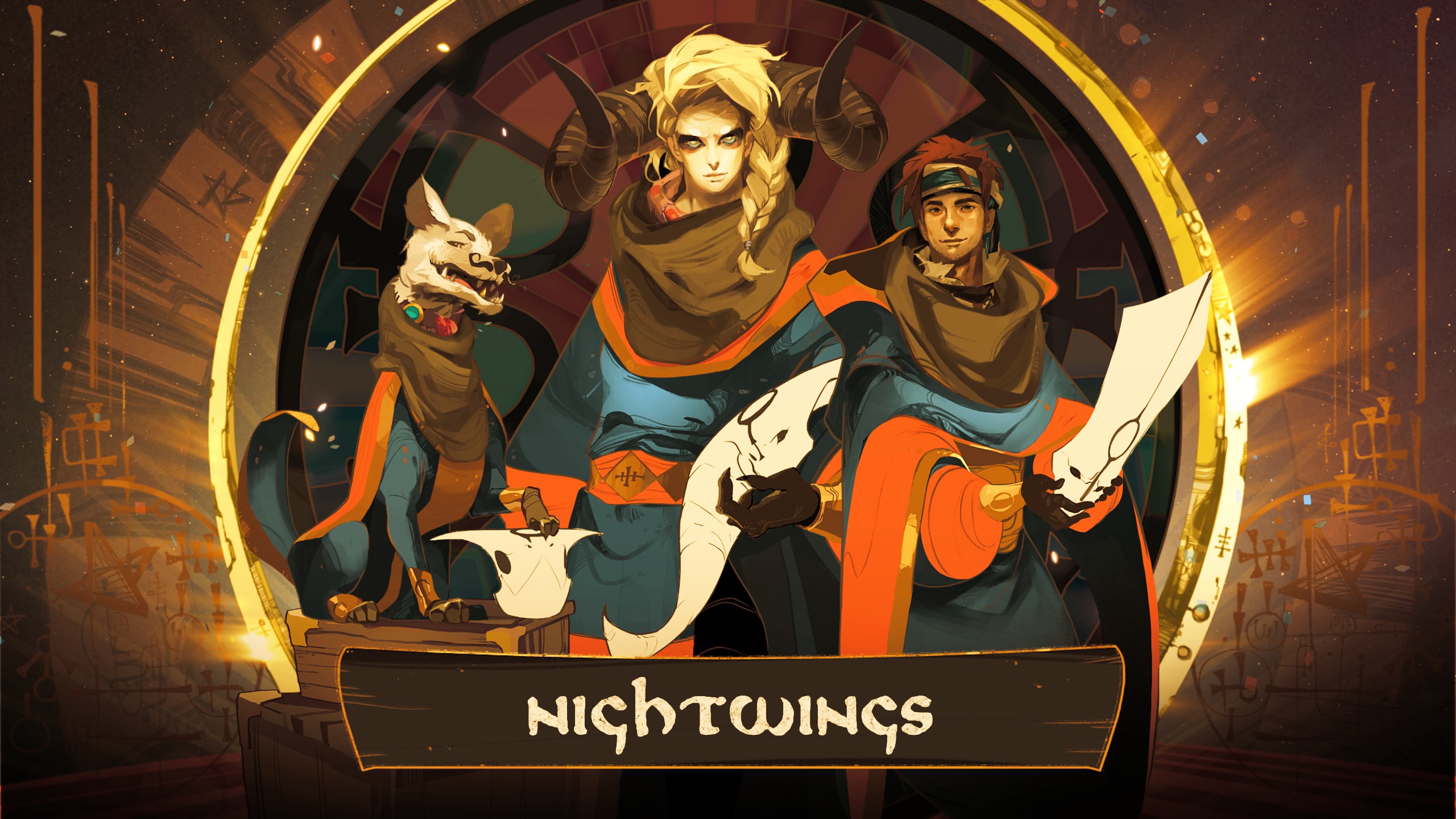
(Note: This article contains spoilers for Pyre, Transistor, and Bastion.)
2017 is a year that has made me want to escape, preferably to a part of the wilderness where no one would show me a newspaper or a tweet ever again. Since I get cold easily and I’m not as great at hunting live animals as Far Cry would have me believe, I opted for another source of escapism: videogames. In these often scary times, Supergiant's games Pyre, Transistor, and Bastion helped me stay sane.
Pyre drew me in with its candy-colored visuals and mustachioed dog, but just like Supergiant's previous games, it explores the very questions I was trying to ignore—how to bridge the differences in opinion that threaten our peaceful lives together, where the desire for drastic change comes from, and how to act in a time when the threat of war gets casually thrown around every other day.
Freedom and faith
Mechanically, Pyre is a sports game. In its world of exiles trapped in limbo, you direct a lovable and diverse team of misfits through 'rites', which are athletic competitions in which you fling an orb into the opposing team’s pyre. Winning rites eventually means one of your team is freed from exile. If you lose, one of your opponents goes free instead. Either outcome is valid, which releases you from the pressure of competition entirely if you let it. I could just throw a mystic basketball around a court for a few blissful hours.
The most frightening antagonists are the ones we can relate to in some way
Greg Kasavin
Once invested in the world and its inhabitants, I got to know an imperfect society both from the perspective of those who still lived in it and those who do not. Exile in Pyre is their one-stop solution for a variety of crimes, and the reason for this harsh punishment lies in a divine prophecy that might be all based on a misunderstanding. Questioning what your characters previously took for granted can end in your team being instrumental in nothing short of a revolution. How you finish the game, even whether or not you win, is not as important to its makers as giving you something to think about.
Supergiant writer and designer Greg Kasavin sums it up: "Pyre’s story is an exploration of the relationship between freedom and faith, and what freedom and faith mean and entail," adding that the role these forces play in the lives of many people applies in the real world across countries and cultural boundaries.
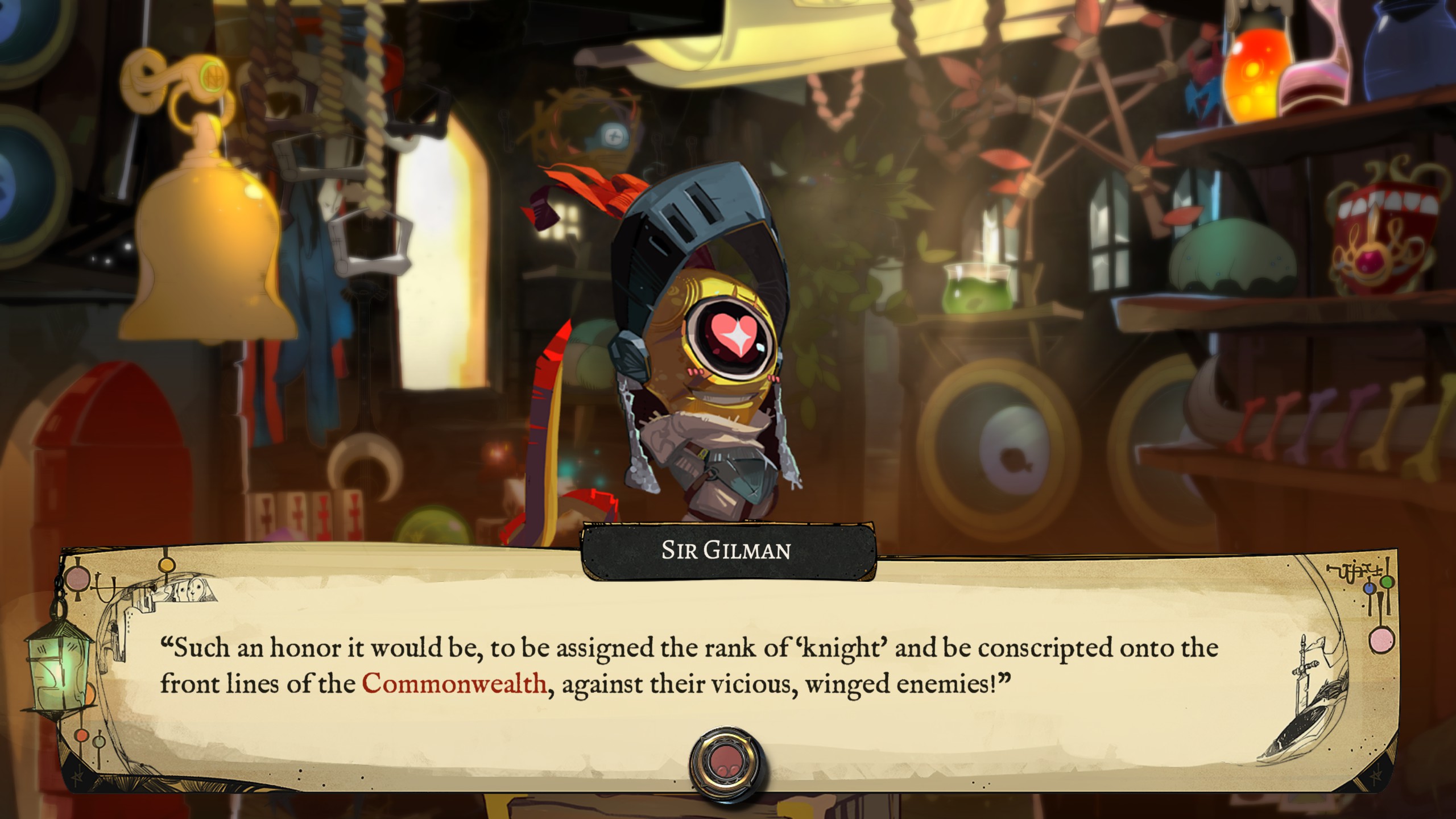
In Pyre, your role in events is passive. You can't send yourself home. Instead you play for others, and have the inexplicably strong feeling of cheering someone on from the sidelines. It’s an empathy that seems to largely be missing in those marching the streets with tiki torches, demanding solutions that benefit themselves first and others never. The crisis of faith at the centre of Pyre is also a very modern concern. Changing a belief you have held onto for a long time, religious or not, can be difficult.
Keep up to date with the most important stories and the best deals, as picked by the PC Gamer team.
The society in Pyre seemingly works, for the most part. Many of the game’s exiles want to return to it, but that doesn’t mean it is always fair and wouldn’t benefit from diversity. Exile makes everyone outcasts, and it’s from this new position of equality that they can attempt to overhaul the system if they keep working together, challenging previously established conventions.
It's important to Kasavin to not create black-and-white stories with clearly defined villains. "I think characters are far more interesting and believable if there's something about them that you can understand or relate to," he says. "At the least, you should be able to understand why they've made the choices that they've made, even if they've made poor choices. The most frightening antagonists are the ones we can relate to in some way, and see that whatever unconscionable choices they've made may have been well-intentioned somewhere down the line."
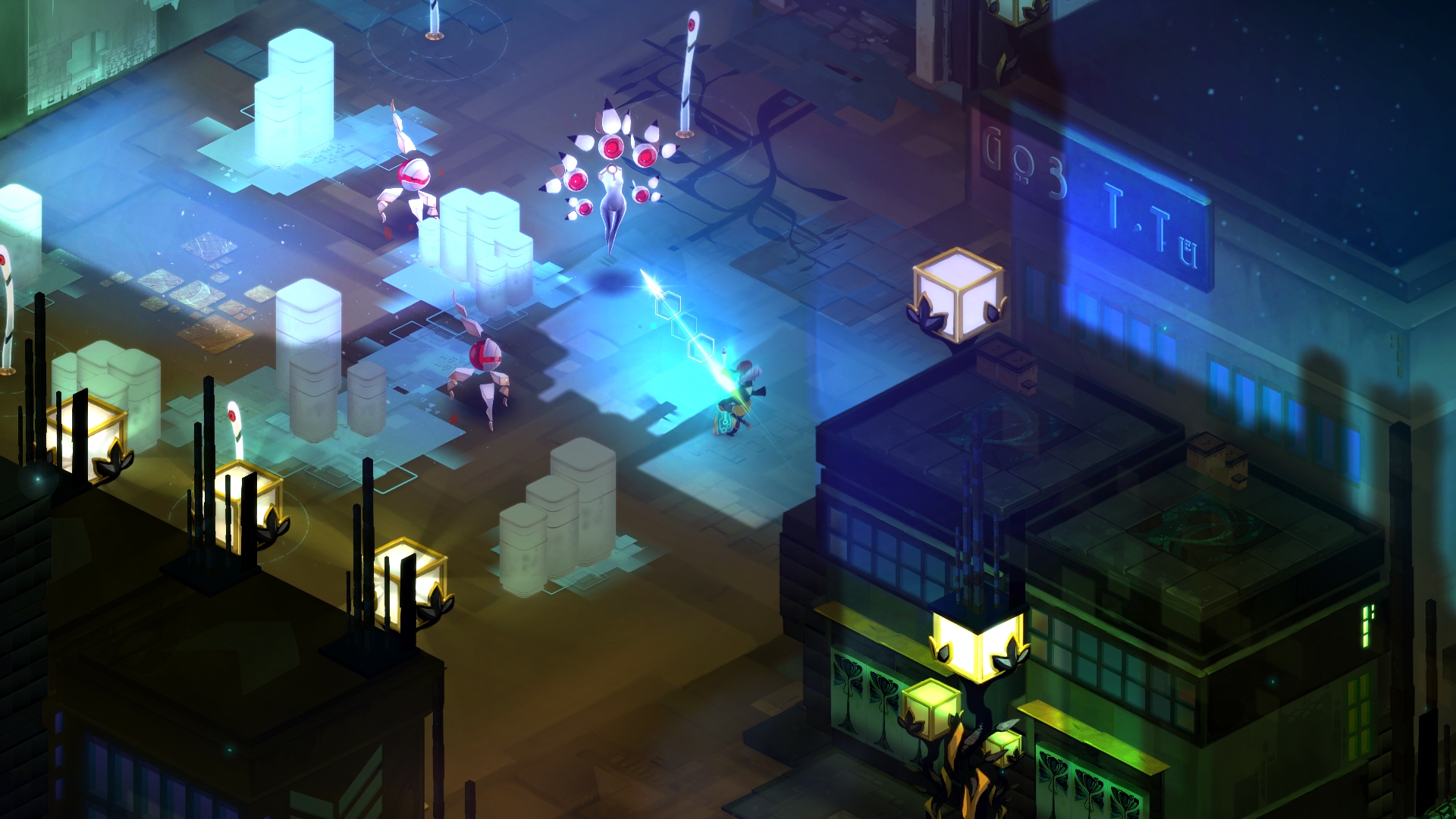
The Process
Supergiant’s 2014 game Transistor shows this best. The virtual metropolis of Cloudbank where it's set is being slowly eaten away by a virus called the Process, and it’s implied the Process was previously used to repair and alter parts of the city by its creators and civil servants—a tool made with good intentions taken too far.
I think it's important for the story to invite the player to be introspective about it
Greg Kasavin
A group of such people called the Camerata feel their well-intentioned solutions going unappreciated, which leads them to drastic actions that pose a threat to the city's inhabitants. Even though they are established as antagonists, like all the characters you meet the Camerata share a strong identification with their home. It's only fear that separates you.
Transistor’s playable character, Red, is a popular singer and a muse to many. I believe the choice of occupation is deliberate. In our own "post-facts" era, faced with the fear of losing a national identity to globalization, many have started looking to public figures and national icons to help us form our opinions. But at the very beginning of Transistor, Red is silenced. She's the only one listening in a world where everybody seems to be talking.
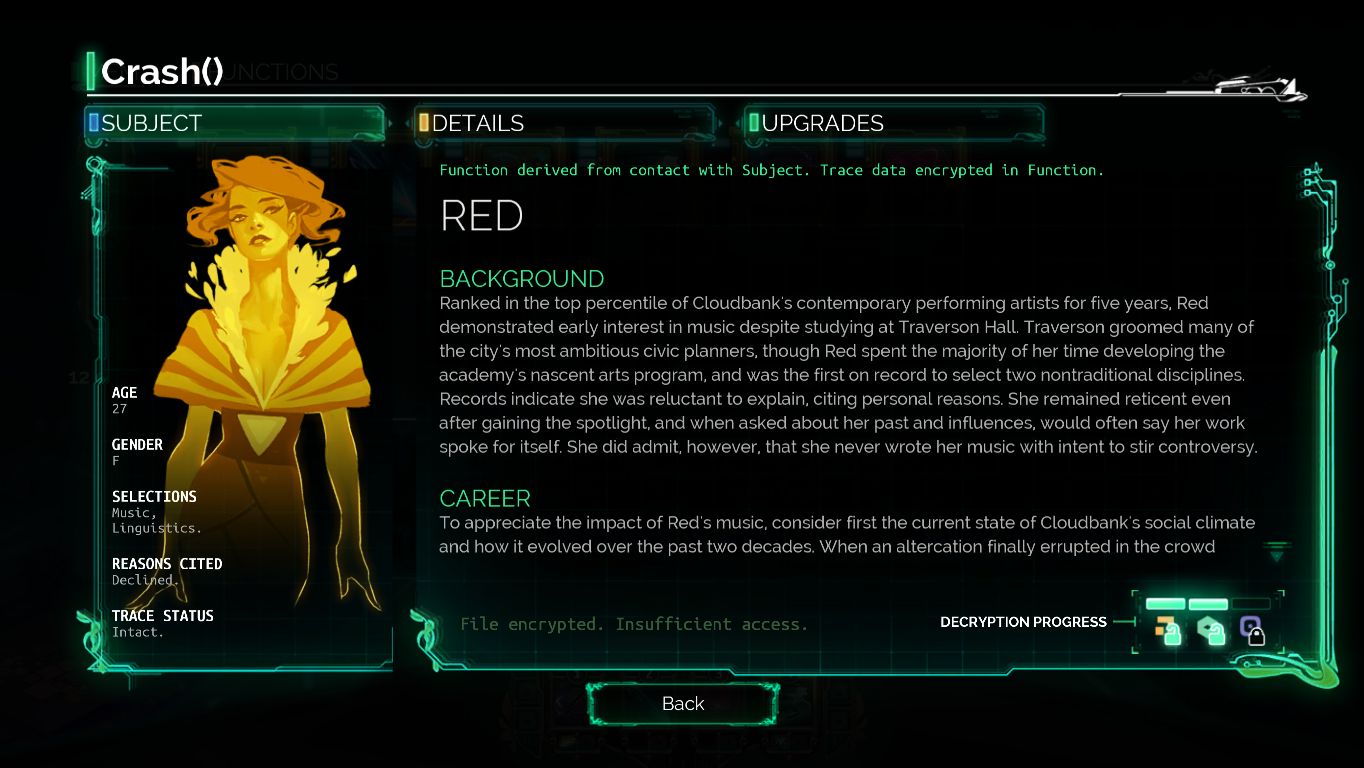
Unlike Pyre’s team of magic basketball players, Red ultimately chooses not to try and save her home, overwhelmed by the losses she has endured. Some players have criticized this finale, but as unaccustomed to sad endings as we still are in videogames, I think this shows it‘s important to be realistic about what a sole person can accomplish and how much power we give an individual. While in Pyre you are part of a larger circle working to achieve change that includes everyone, Red is one person with the responsibility for many. Her position is not unlike that of the Camerata, who chose to destroy Cloudbank in the first place.
Build that wall
The predicament of the Kid, the protagonist of Supergiant’s first game Bastion, is similar again. In Bastion you get to be a kind of cowboy, saddled (sorry) with the responsibility of rebuilding his world after a catastrophe wipes it out. Just like Red, the Kid has to question whether his world is worth saving. He begins this task before he knows the catastrophic event, called the Calamity, was caused by his own country and meant to end a war over territory with their neighbors.
When I ask Kasavin why despite this you don't spend most of Bastion fighting real people, he tells me it’s always important not to trivialize violence. "It's not an accident that death is not a subject taken lightly in any of our games," he explains. "It's not something I'm comfortable making light of, and if one of our games is going to have a lot of killing in it, as in Bastion, then I think it's important for the story to invite the player to be introspective about it."
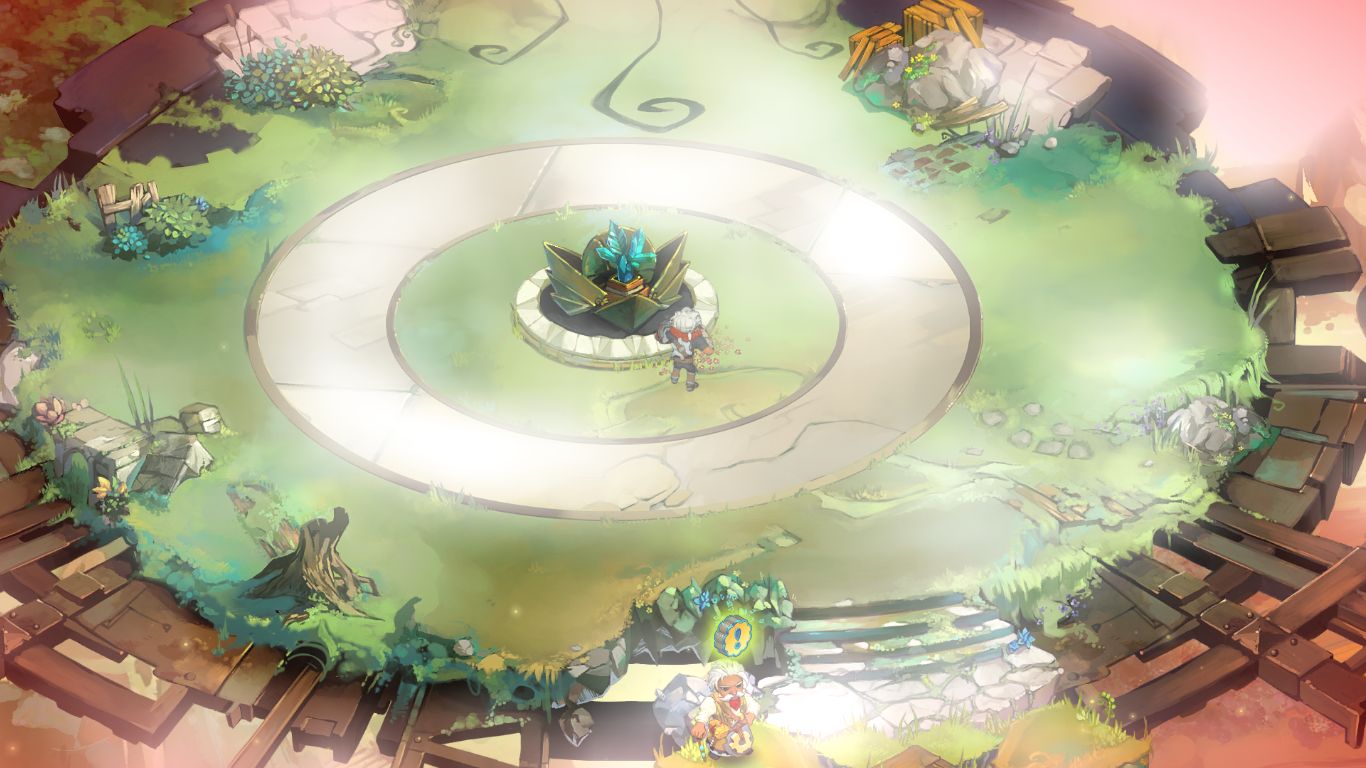
How do you act when you know it was your own country that did unspeakable things to win a conflict? Bastion explores the motivations of the people caught up in this and even suggest the monsters you fight as you try to restore order may be trying to stop you to ensure past mistakes aren't repeated. In the final moments of Bastion, you can choose to turn back time or to learn from those mistakes. Both decisions will affect those around you.
Supergiant’s three games all helped me consider the role of the individual and our relationships with each other in different ways. They made me see how hard it can be to challenge your own perceptions and how this can only work if we try to stay open-minded. They made me see how the wrong decision can seem like the right thing to do and how easy running from consequences rather than accepting them can look.
Most of all, in Supergiant's games every decision has its origin and reason. If we try to listen more, even if it’s to a story a videogame tells us rather than the next newspaper horror story, that can motivate us to try to find ways we as individuals can deal with what’s happening around us. In a time where "be nice to each other" sounds like terrible advice, this team of game makers keep unflinchingly repeating just that.
And if that’s too heavy for you, it’s also fine just to throw a mystic basketball around a court for a while.

